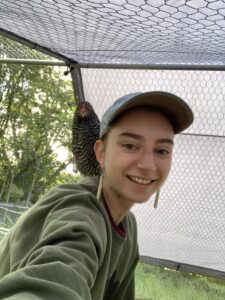Lea la versión en inglés aquí. Veronica Horst has spent the past six months traveling the country and living on communal farms. One thing that all the farms they have spent time on have in common is an abundance mentality and the desire to share the fruits of their labor.
This blog is part of the ongoing Learn, Pray, Join: Climate Justice: Seeking Shalom series.
 Veronica Horst grew up attending Landisville Mennonite Church in Lancaster, Pennsylvania. After graduating from Eastern Mennonite University, with degrees in art and psychology, in 2023, they decided to embark on a journey across the U.S., learning and working on farms through the organization WWOOF (WorldWide Opportunities on Organic Farms). Veronica has enjoyed leaning into this experience, as an opportunity for experiential learning, wisdom seeking and spiritual connection.
Veronica Horst grew up attending Landisville Mennonite Church in Lancaster, Pennsylvania. After graduating from Eastern Mennonite University, with degrees in art and psychology, in 2023, they decided to embark on a journey across the U.S., learning and working on farms through the organization WWOOF (WorldWide Opportunities on Organic Farms). Veronica has enjoyed leaning into this experience, as an opportunity for experiential learning, wisdom seeking and spiritual connection.
_________________________________________________
I am writing this from a treehouse situated among the California Redwoods, overlooking beds of raspberries, fava beans and a lane of fruiting citrus trees. There is a lingering mist this morning and the forest feels still — silent except for the sounds of a purple finch and an airplane overhead. For roughly the past six months, I’ve been traveling across the country, living and working on small farms and homesteads. I didn’t go to school for agriculture or environmental science, nor did I grow up farming. However, as I was preparing to graduate from Eastern Mennonite University, in May 2023, I felt a strong pull to spend more time in the dirt and learn how to live simply and sustainably from people who are doing just that.
The first farm I stayed at was an urban garden outside of Raleigh, North Carolina. Right away, it was obvious how much this garden meant to the surrounding community. Groups of college students come to the garden every Wednesday and Saturday to help with whatever projects are underway, in exchange for homemade pizza, fresh produce and kombucha. Others in the area —people looking for opportunities to spend more time outside, mothers with their kids, neighbors and other local farmers — volunteer throughout the week. I feel grateful to have experienced this community and their perspective of abundance, as it was a beautiful example of how tending to the earth also cultivates relationships.
Community has looked different at every farm I have stayed at, but this mindset of abundance and attitude of generosity is something that has been present in each place. Even after dozens of fruit trees were taken out by a harsh summer drought at a homestead in Louisiana, my hosts were thrilled to send handfuls of the surviving persimmons with anyone who visited. A worker at a farm in Georgia taught me how to cook over an open fire. He made eggs for breakfast for everyone else, even when there weren’t enough eggs for him to eat, and he eagerly shared the dishes he prepared from the rabbit and squirrel meat he had hunted. My hosts in Austin, Texas, took bags of kale and arugula with them to give out at friend gatherings. They welcomed me into their Thanksgiving festivities, even though I was a stranger, and made sure I was supplied with tons of fresh greens and homemade granola when I left for my next place.
Right now, I am at my eighth location — a permaculture farm in Watsonville, California. The workers here share the same generous spirit.
When I thanked one of them for giving me some of the food they had cooked, they responded with, “Well of course — food is just like any other kind of wealth — it is meant to be shared. If you don’t share it, what’s the point?”
This experience has been a continuous lesson of abundance and generosity for me, but even more so, it is a lesson in symbiosis. I am reminded by my farming friends and by the earth that tending to others and tending to oneself are often one in the same. I think often of when my host in Louisiana cut open a giant napa cabbage and handed me the delicate bud of leaves from the very center, saying, “This is chi! This is the life force energy that is in everything! Taste it.” I learned so much from him about the interconnectedness of all living things and how even our thoughts are not isolated events. What lives in our minds manifests in our actions, which affects how we treat one another.
These farmers are caretakers of the earth, as well as dreamers. They have visions for the lands they are on; hopes for the communities that will continue to create and be created by the spaces. They are also keenly aware of weather patterns and signs of climate change, which can easily procure feelings of overwhelm and hopelessness. While holding fear and anxiety around climate change, they continue to grow and feed and nurture the chi that is in all of us, and that gives me a lot of hope and inspiration to do the same.

As followers of Jesus, we seek God’s dream of shalom for all people and all of creation, including our climate. Shalom requires that we seek justice and healing for our relationships with God, with one another and with the earth that sustains us.
You are invited to get involved with Learn, Pray, Join: Climate Justice: Seeking Shalom.
Support Mennonite Church USA’s Peace and Justice Initiatives by giving here.
The views and opinions expressed in this blog belong to the author and are not intended to represent the views of the MC USA Executive Board or staff.
Interested in submitting a blog for Menno Snapshots? Please see our blog guidelines here.

